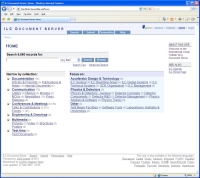Director's Corner
29 March 2007
 Barry Barish |
ILC Project Tools: ILCDoc - Document Search and Store
 Maura Barone, GDE Project Tools Manager |
We are in the process of building an integrated set of ILC project tools for communication, data archiving, engineering, costing, scheduling and project management. Already, we make extensive use of communication tools for organising and holding all of our meetings. The basic meeting planning tool we use is Indico, which I wrote about in a previous column. Our version is synchronised with the official CERN version and we already have more than 6000 separate events (conferences, meetings and talks) stored. We often combine Indico with “webex,” a web-based meeting tool for holding scheduled on-line meetings.
Today I am announcing the official release of our next ILC project tool, the document server ILCDoc, which is based on CERN CDS-Invenio document server. ILCDoc will mostly contain documents with textual or graphic information such as technical notes, communication, schedules, presentations, publications etc. Documents containing engineering data such as drawings, technical specifications and cost estimates will be organised into the engineering data management system (ILC EDMS), based on UGS Teamcenter that was developed at DESY. We will eventually build an interface between these two systems so that information can be shared. We are migrating the many existing ILC and GDE documents onto the ILCDoc system and plan to place as many of the documents as possible in the public area. ILCDoc can be accessed through a link on the ILC home page or at http://ilcdoc.linearcollider.org/.
 ILCDoc Homepage |
ILCDoc will facilitate communication and provide an easy-to-use retrieval engine for ILC information, while the goal of ILC EDMS, which is still under development, is to provide specific technical and project tools and information. Documents in the ILCDoc system are generally texts or multimedia files, for example notes, presentations, reports, preprints, proceedings, minutes or photos and videos.
To facilitate classification, documents have been assigned four attributes: type, class, collection and topic. The INTERNAL class mainly identifies documents for internal use or ones reflecting work in progress. This class can be used for information exchange within the ILC, while documents that are meant for the wider scientific community or the general public are put into the PUBLIC class. The classifications ‘topic’ and ‘collection’ are used to partition the totality of the documents into subsets that might help the user's browse and search processes. In particular, 'topic' is meant to collect groups of documents that share common features, reflecting an organisational structure or a technical subject.
ILCDoc features a search engine that allows searches across different collections and types of documents through simple or advanced interfaces. You can search by title, author, keywords, date or full text. Additionally, ILCDoc allows searches through public documents submitted to the ILCAgenda system. This very important feature means all the information from our many meetings is archived and can be accessed through ILCDoc.
The implementation of ILCDoc is a very important step forward in developing the set of tools we need to enable our world-wide collaboration to work together effectively and to provide easy access to many documents.
We owe special thanks to Maura Barone for implementing ILCDoc over the past six months. Contact Maura at ilcdoc-support@linearcollider.org for questions regarding this new system, and I urge you to give it a try soon. I predict that you will very quickly be hooked!
-- Barry Barish